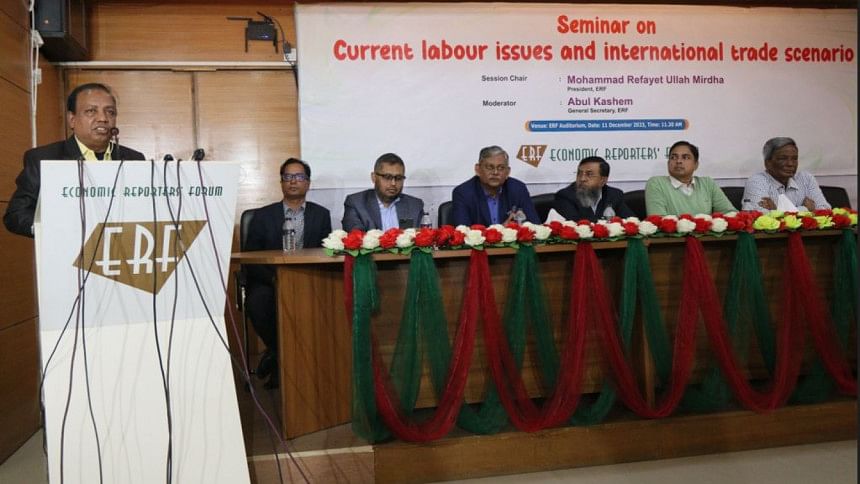RMG wage board inconsistent with market scenario

The recently declared wage board for garment workers is inconsistent with the present market scenario, workers' leaders said at a seminar yesterday.
After weeks of unrest by agitating garments workers, it was formally announced on November 7 that the new minimum salary for garment workers would be set at Tk 12,500.
"The wage board is not acceptable internationally, to the International Labor Organisation, or to the workers," said Amirul Haque Amin, president of the National Garment Workers Federation.
He was addressing a seminar organised by the Economic Reporters' Forum (ERF) on "Current labor issues and international trade scenario" at its auditorium yesterday.
He added that the labour conditions in the country's readymade garment (RMG) sector were not reflective of a situation that could lead to any economic or trade sanctions.
"How many of the ILO conventions have been ratified by those who want to give the sanction? They have only ratified two of the eight conventions. Bangladesh has ratified all eight," he said.
He added: "What they want, they did not ratify themselves. And they want to control other countries."
"Bangladesh has no reason to be afraid. We are not in such a bad position that we will fall under sanctions. Our labor situation has improved considerably."
Towhidur Rahman, former secretary general of IndustryALL Bangladesh Council, opined that the diplomatic note from the Bangladesh embassy in Washington DC to the commerce ministry about possible measures like trade penalties and visa restrictions over labour issues must be taken into consideration.
He said that four workers died during the protests by RMG workers to demand higher wages but the cause of their death had not yet been investigated. If a murder is not investigated, then we will not get justice, he noted.
"Some 115 people are in jail in 43 cases. About 25,000 workers have been made defendants," he said, urging employers to help form trade unions.
Echoing Amin, Mohammad Hatem, executive president of Bangladesh Knitwear Manufacturers and Exporters Association (BKMEA), said there was no situation in the RMG sector that demanded the imposition of sanctions by the US.
Hatem conceded that Bangladesh's apparel industry may lag behind international standards, but he said it was still in a far better situation compared to China and other countries.
If any sanctions are imposed despite that, then it would be for political reasons or because of vested interests, he opined.
Speaking about the latest amendment to the labour law, which President Mohammed Shahabuddin did not sign, Hatem said owners and workers' representatives had agreed to remove the threshold requirement for registration of trade unions.
The threshold had been fixed at 15 percent for factories with more than 3,000 workers and 20 percent for units with less than 3,000 workers.
Fazlee Shamim Ehsan, vice-president of the BKMEA, said that the present standard of labor in Bangladesh met international standard as per ILO.
He agreed with the complaints made by Towhidur and, echoing Hatem, termed the situation 'political', adding that the government should address it diplomatically.
"If there is anything behind the scenes, it is up to the government to take measures," he said.
Mustafa Abid Khan, economist and member of the Bangladesh Trade and Tariff Commission, said trade sanctions are unlikely according to the memorandum from the US.
This is because, as per the rules of the World Trade Organization, it is not easy to impose sanctions. There is also little chance of raising tariffs, he noted.
"There may be a penalty based on the individual," he said.
He suggested playing a proactive role rather than being reactive or fearful.
"Organisations working on international labor issues feel that the government and the private sector are speaking in the same tone," he said.
The seminar was presided over by Refayet Ullah Mridha, president of ERF, ANM Saifuddin, former BGMEA director and chairman of standing committee on ILO and labour affairs, and Abul Kashem, general secretary of ERF addressed among others.

 For all latest news, follow The Daily Star's Google News channel.
For all latest news, follow The Daily Star's Google News channel. 



Comments